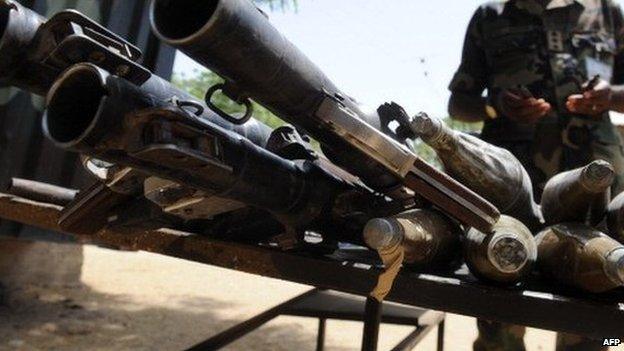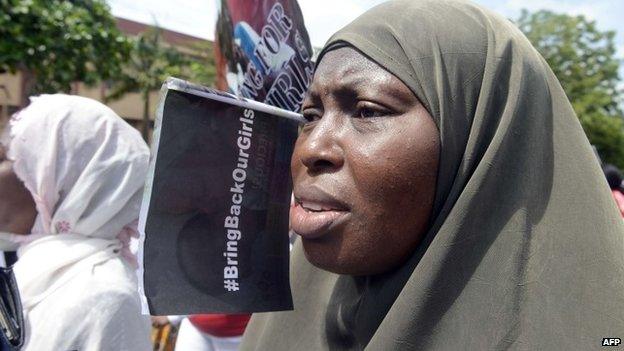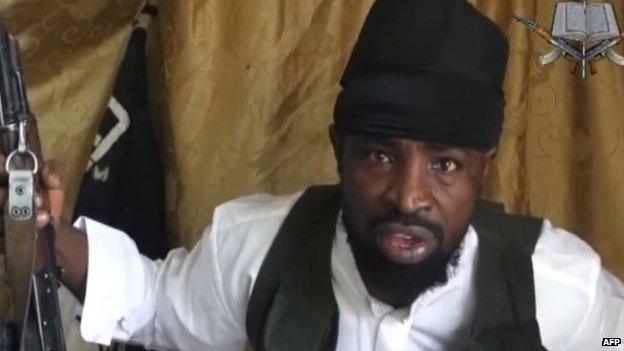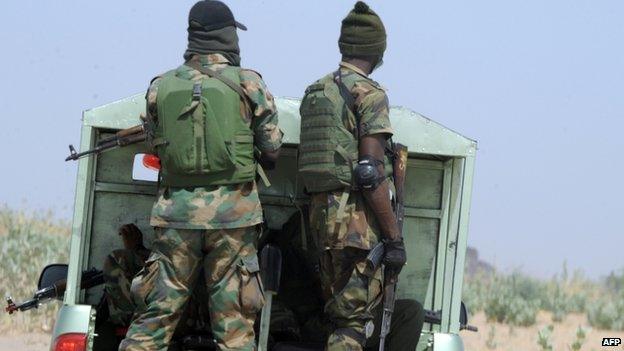Nigeria confirms market massacre blamed on Boko Haram
- Published

Boko Haram insurgents are well-armed and often travel in convoy when launching an attack
Nigeria's government has confirmed that suspected Islamist insurgents attacked a town in the north-east, massacring civilians during a busy market day.
Presidential spokesman Doyin Okupe told the BBC the official death toll was between 100 and 150.
Residents and the area's MP have said more than 300 residents died in Gamboru Ngala during the five-hour attack.
Mr Okupe said the country welcomed international support to defeat Boko Haram, but defended its record.
"We are even fighting a war that we have to limit and manage collateral damages - but the insurgents do not care," he told the BBC's Newsday programme.
"They can kill soldiers, they can kill villagers, but we cannot do that. And people must understand that, we have to fight this war within the rules of engagement that is accepted internationally."
Boko Haram means "Western education is forbidden" in Hausa
Boko Haram, whose name means "Western education is forbidden" in the local Hausa language, began its insurgency in Nigeria's north-eastern Borno state in 2009.
At least 1,200 people are estimated to have died in the violence and security crackdown this year alone.
International attention to the crisis has been galvanised by the kidnapping more than three weeks ago of more than 200 teenage girls from their school in Borno's Chibok town.

For the past week there have been daily protests countrywide calling for more to be done to find the girls

Boko Haram's leader has threatened to "sell" the abducted schoolgirls
Malala Yousafzai, the Pakistani schoolgirl who survived a shooting by Taliban insurgents, has said the world must not stay silent over the abduction.
She told the BBC that "if we remain silent then this will spread, this will happen more and more and more".
Former UN chief Kofi Annan also appealed for action. He criticised both the Nigerian government and other African nations for not reacting faster to the kidnapping, and called on them to use whatever was at their disposal to help free the girls.
The abduction of the girls has overshadowed the World Economic Forum which opened in the Nigerian capital, Abuja, on Wednesday evening.
The US, UK and France have despatched teams of experts to Nigeria to help recover the girls.
'Diversion'
The town of Gamboru Ngala, near the border with Cameroon, was crowded with traders for the market day on Monday when the suspect Islamists militants attacked.
Senator Ahmed Zanna told the BBC's Hausa service that they arrived in a convoy of vehicles, shooting, stealing food and motorbikes and burning hundreds of cars and buildings during their rampage.

A presidential spokesman said the armed forces have had to learn counter-terrorism skills over the last few years
Another resident said they were shouting "Allahu Akbar [God is great]".
The militants had used a diversionary tactic to get the security forces out of Gamboru Ngala by spreading rumours that the abducted schoolgirls had been spotted somewhere else, Mr Zanna and several residents said.
A resident of Gamboru Ngala told the BBC that 310 people had been buried on Tuesday and Wednesday.
"At the big cemetery of Gamboru Ngala, I recorded 165 buried. At the small graveyard, I recorded 145 graves. But we are still picking corpses from the main market," he said.
"Many people locked themselves up in the market when the attacks started so they got burnt in their shops."
Correspondents say it often takes time for news of such attacks to spread as mobile phone networks can be affected by the security crackdown in the region.
